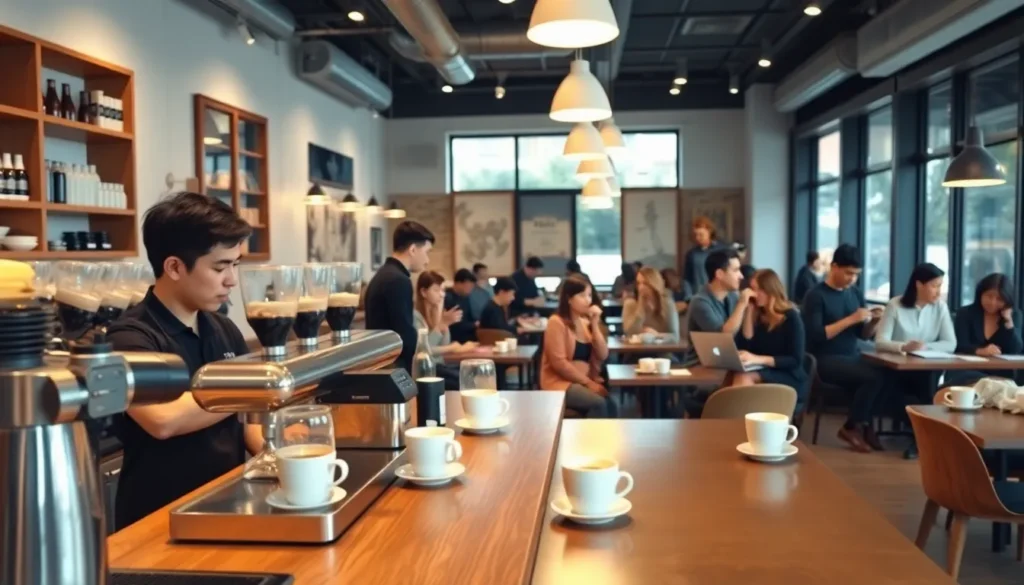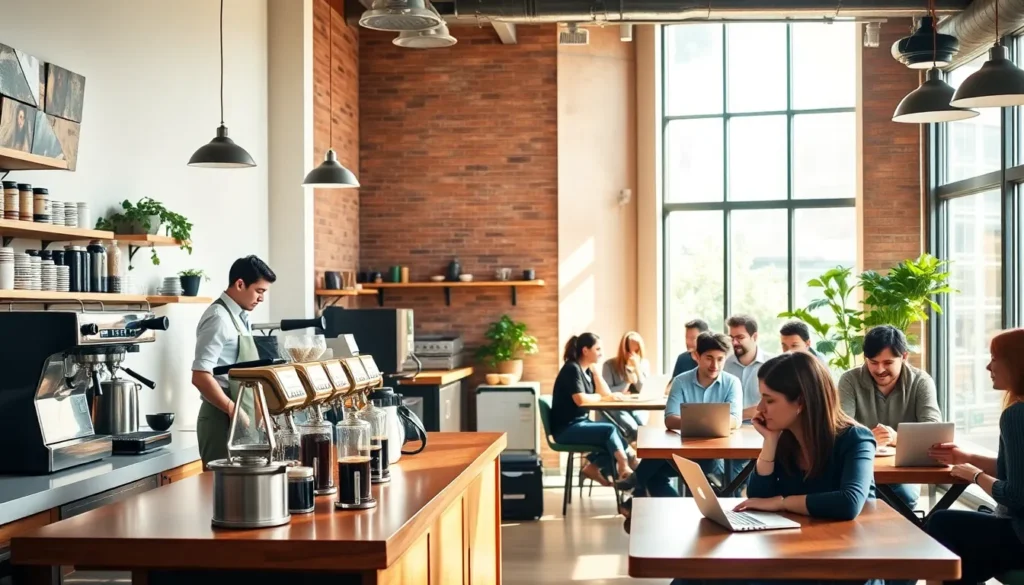Table of Contents
ToggleCoffee isn’t just a drink: it’s an experience, a ritual, and sometimes, an excuse to avoid doing the dishes. From the bustling streets of Italy to the serene tea houses in Japan, coffee culture serves as a mirror reflecting the values and traditions of different societies. Curious about how global communities interpret their caffeine fix? Buckle up as we journey through steaming cups, frothy lattes, and cultural quirks that make coffee consumption truly fascinating.
The History Of Coffee Consumption

Origins Of Coffee Drinking
The story of coffee begins with a goat herder named Kaldi in Ethiopia, who noticed his goats frolicking energetically after munching on beans from a certain tree. Intrigued, he decided to try the berries himself and experienced a burst of energy. Soon, the local monks discovered that brewing these beans into a drink helped them stay awake during long hours of prayer. This mystical beginning set the stage for coffee to become a global phenomenon.
Evolution Of Coffee Shops
By the 15th century, coffee had spread to the Arab world, transforming from a mystical potion to a social ritual. The first coffee houses, known as qahveh khaneh, sprouted in cities such as Mecca and Istanbul. These establishments became the go-to spots for socializing, playing chess, and discussing politics. As the drink traveled to Europe in the 17th century, coffee shops evolved into centers of intellectual exchange, famously dubbed “penny universities.” For just the price of a cup of coffee, one gained access to the latest ideas and debates of the time.
Regional Coffee Practices
Europe: Coffee Traditions And Variants
In Europe, coffee culture varies dramatically from country to country. Italians take pride in their espresso, while the French prefer a leisurely café au lait. In Scandinavia, coffee breaks, or fikas, encourage socializing with friends over lush cinnamon buns. From the rich, robust flavor of Turkish coffee sipped in Turkey to the delicate charm of Swedish fika, each region adds its unique twist to coffee-related traditions.
Asia: Coffee Rituals And Enjoyment
Across Asia, coffee rituals offer a compelling glimpse into the cultural fabric of the countries. In Japan, the art of preparing and drinking coffee can be likened to a spiritual ceremony, reflecting the importance of patience and craftsmanship. Vietnam serves its coffee iced with sweetened condensed milk, providing a delightful contrast to the often sweltering heat. Chinese coffee culture is growing rapidly, blending traditional elements with modern practices, showcasing how coffee can adapt to local tastes.
The Americas: Diverse Coffee Cultures
North America’s coffee culture is dominated by convenience and novelty, highlighted by the rise of specialty cafés featuring seasonal flavors and artisanal brewing methods. In contrast, Latin America boasts a deep-rooted coffee heritage. Countries like Colombia and Brazil not only produce some of the world’s best beans but also celebrate coffee as a national treasure, often enjoying coffee shots straight or mixed with sugarcane liquor.
Africa: The Birthplace Of Coffee
Though many connect coffee with Africa, its cultural significance is profound and often ceremonial. Ethiopia, the alleged birthplace of coffee, celebrates the Jebena ceremony, a ritual showcasing hospitality. Traditionally, coffee is prepared in a clay pot and served in small cups, often accompanied by a discussion of life and community. Originating from the heart of coffee’s history, African practices are rich and varied, reminding everyone that each cup has a story.
Modern Coffee Culture Trends
Specialty Coffee Movement
In recent years, the specialty coffee movement has taken the world by storm. This trend emphasizes the quality of the beans, the unique flavor profiles, and the meticulous brewing process. Baristas are no longer just servers: they are skilled artisans deeply knowledgeable about the origin of their coffee. This focus on craftsmanship has transformed coffee intake into an art form that captivates both enthusiasts and casual drinkers alike.
Impact Of Social Media On Coffee Culture
Social media platforms have also played a pivotal role in shaping modern coffee culture. From aesthetically pleasing coffee art to influencers showcasing trendy café spots, Instagram has created a visual language of coffee consumption. People no longer just drink coffee: they engage with it online. This dynamic exchange promotes cafés and encourages small businesses to innovate, grow, and connect with their customer base in exciting ways.
Future Of Coffee Culture
Globalization And Its Effects
As the world becomes more interconnected, coffee culture is also evolving. The fusion of different regional styles creates exciting new experiences. For instance, hybrid beverages like the Japanese-style cold brew served with Italian-style gelato exemplify this trend. The future of coffee culture seems to be a delightful mix of flavors and practices, making global coffee tattoos richer than ever before.
Sustainability And Ethical Consumption
Sustainability is increasingly taking center stage in coffee culture discussions. Consumers are becoming more conscientious, seeking ethically sourced coffee that supports farmers and reduces environmental impact. The rise of certifications like Fair Trade and organic coffee demonstrates a collective shift towards responsible consumption. More cafés are prioritizing transparency in their supply chains, ensuring that every cup of coffee served has a positive story attached.




